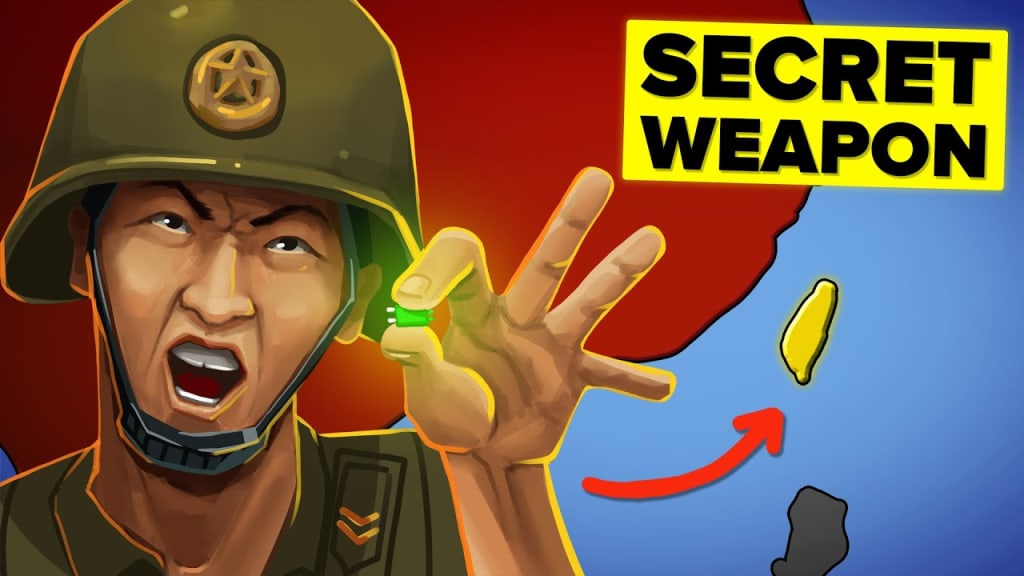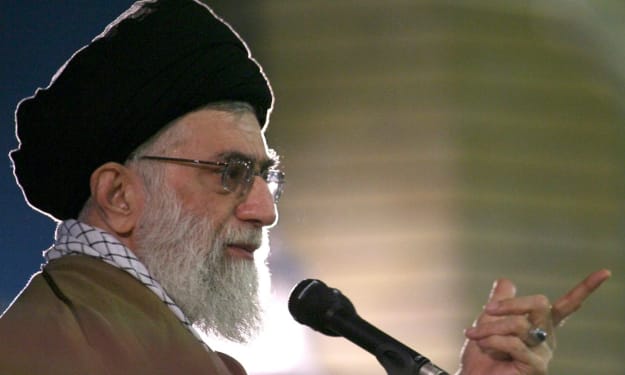How would Taiwan use this little weapon to hurt China?
China is one of the world's most powerful countries, with a population of over a billion people, one of the most powerful armies outside of the United States, and a formidable nuclear arsenal. Taiwan is a small island republic that has steadfastly defended its independence for more than a half-century yet is vastly outgunned by its neighbor. But does Taiwan have a hidden weapon in its sleeve that may instantly weaken China's grip on it - and is this also Taiwan's biggest vulnerability? To discover out, read this amazing new narrative! ❗🔩⛔❗

China is one of the world's most powerful countries, with a population of over a billion people, one of the most powerful armies outside of the United States, and a formidable nuclear arsenal. Taiwan is a small island republic that has steadfastly defended its independence for more than a half-century yet is vastly outgunned by its neighbor. But does Taiwan have a hidden weapon in its sleeve that may instantly weaken China's grip on it - and is this also Taiwan's biggest vulnerability? To discover out, read this amazing new narrative! ❗🔩⛔❗
With well over a billion people, one of the most effective militaries outside of the United States, and a potent nuclear arsenal, China is one of the most powerful nations in the world. Despite tenaciously upholding its independence for more than 50 years, Taiwan is a small island nation that is vastly outmatched by its next-door neighbor. The upcoming conflict in Asia may be defined by semiconductors, but Taiwan may also have a covert weapon that could instantly weaken China's hold over it. Is this weapon also Taiwan's biggest vulnerability? One of the most vital pieces of equipment in today's technological world are semiconductors, which are crucial to both military and civilian technology.
Between a typical conductor like copper and an insulator like glass, in the sweet spot of electric conductivity, are materials known as semiconductors. The exact opposite of how metal behaves its resistance to electric currents decreases as temperature rises. Because of this, it serves as the key to numerous machines. A semiconductor junction is created when a semiconductor is added to a design structure because the impurity it introduces causes two regions to operate differently. The majority of modern electronics are built around this principle, which enables charge carriers like electrons and ions to flow in specific directions. Initially, vacuum tubes were used to regulate the electric flow in computers and other devices, but nowadays, almost everything is powered by semiconductor technology.
Transistors, diodes, and semiconductors are absent. No computers, no computerized modern military technology, no transistors and diodes. Almost everything we use on a daily basis is supported by these tiny gadgets. And everything depends on the availability of the necessary components. Along with Germanium, a synthetic zinc alloy called Gallium Arsenide, and silicon, which is the most prevalent semiconductor used in these devices. The only thing preventing us from going back to a much earlier era of technology and the collapse of many modern industries knows how to mine for these compounds, refine them, treat them, and use them to create the tiny chips that make computer function possible.
It's a good thing that numerous scientists are actively working on them throughout the world. The world has permitted Taiwan Semiconductor Manufacturing Company Limited to consolidate the vast majority of semiconductor design and manufacturing under its roof. When it was established in 1987, it was not only the first manufacturer exclusively focused on semiconductors, but also the largest semiconductor company in the world. Morris Chang, the company's founder, worked to seize market share early on because he recognized how important these devices would be in the future. After 31 years as the leader, he retired having achieved success beyond his wildest expectations.
It is currently one of the most valuable companies in the world, with a value of over $400 billion. Furthermore, because it is publicly traded, foreign investors own the majority of the company. And there's a good reason for that. It's likely that any significant business you are aware of depends on TSMC in order to run efficiently every day. Even though it probably doesn't have any direct interactions with the business, if it uses electronics, Taiwan is probably where some of the semiconductors are found. In fact, TSMC contracts are held by a large number of semiconductor device manufacturers, including Broadcom and Apple. The production is still outsourced to the Taiwanese company.
It all comes back to the enormous facility at Hsinchu Science Park, which is arguably the most significant company in the entire world. And that gives it a lot of sway. Due to the pandemic and the ensuing labor and resource shortages, almost all industries experienced slowdowns and shortages after 2020. However, many of those shortages might have resulted from production problems at TSMC, which is located in a nation that implemented stringent measures to stop the virus' spread. Even though Taiwan's lockdowns were never as severe as those of their Chinese competitors, they still restricted operations for several months, and the shortage of semiconductors that resulted is still felt today.
Because modern cars have sophisticated computers inside of them, it even forced a number of important automakers to temporarily halt the production of new vehicles. Alexa, play On the Road Again. And when so much depends on one nation, it can create difficult problems. Taiwan is thought to produce nearly two-thirds of the world's semiconductors, with TSMC accounting for 54 percent of that total. China is in third place with only six, South Korea is second with 18 and there are 13 other countries total. Therefore, a disruption in Taiwanese microchip production could not only result in delays in global manufacturing, but it could also give the small island nation the power to determine the winners and losers in any international conflict, even one that is specifically directed at it.
Without Taiwan's consent, that might still happen. Since the Taiwanese civil war in the 1940s, China has consistently maintained that Taiwan is a part of China. In a blood feud akin to that between North and South Korea, both governments consider themselves to be the legitimate authorities in all of China. China, which has the military and diplomatic upper hand, has been putting pressure on other governments to refuse to recognize Taiwan as a nation. The majority of nations are in agreement; they maintain diplomatic ties with Taiwan without formally endorsing its independence from China. However, there are times when China's pressure goes too far, like when a Chinese propagandist suggested that if Speaker Nancy Pelosi visits Taiwan, China should shoot her plane down.
Pelosi visited Taiwan unharmed, and China's bluster made it appear like a paper tiger. Cooler heads ultimately won the day. The motivation behind China's desire for Taiwan, however, is much more complex than ego. Due to repeated city shutdowns caused by Covid-related decisions, China's economy has been struggling. China's economy has started to show signs of contraction, and many nations are becoming less willing to invest there as a result of the nation's increasingly restrictive trade policies. Many people are moving their business elsewhere, but if they were in charge of manufacturing all semiconductors, people would be forced to work with them. After all, even a brief shortage sparked panic worldwide as people realized for the first time how reliant they were on Taiwan's production and how many different industries it would affect.
China might consider their course to be straightforward. China has concentrated on growing its air and naval forces, and they are now far more powerful than Taiwan in those domains. Despite having a powerful military, Taiwan does not possess nuclear weapons or carriers for aircraft. They may be able to put up a surprising strong fight against China, much like Ukraine is shocking the world by keeping Russia at bay, but they probably wouldn't be able to do so indefinitely without military support from other powers. There is no treaty requiring US support, and China might believe it can intimidate the United States into withdrawing from the situation even though the United States has pledged to defend Taiwan if it is attacked.
Then it seizes the tools of production. It's easy to see how things might go wrong once China seizes control of the semiconductor factories. China is known for using aggressive trade strategies, so it would probably make this next move in order to use its control over this important sector to compel concessions. The first step would be to declare Taiwan to be a part of China and lift any sanctions imposed on China as a result of its invasion, but this is something Russia lacks the power to do. But it's unlikely that China will remain there. In the South China Sea and the Pacific, they have already conducted other belligerent military operations. While other major powers might be able to increase their own semiconductor production rather than give in to China's demands, it's unlikely that this will happen without significant production delays, the same may not be true for regional nations.
This means that China may be able to seize technology from other nations, the eastern, if not global, technology market is what China likely wants to dominate. Small nations would find it much simpler to accede to China's demands than to try and hold out until they can obtain the necessary technology from other nations. An Asian or African nation might not want to take the risk of defying a technological superpower, provided China's demands aren't too onerous. China will likely believe that, after capturing Taiwan, it can seize control of many other nations without ever firing a shot. The hope is that this will be the case, but reality may be very different. Taiwan has that leverage already; it just depends on how much it wants to use it.
China wants to use Taiwan's semiconductor industry to gain leverage over the rest of the world. In contrast to China, Taiwan has always dealt with the majority of nations with a velvet glove. It is a small power after all, and the United States needs Taiwan more than Taiwan needs the United States. That was the case, at least, before it became a major player in the semiconductor industry. It may now possess the negotiating power required to guarantee ongoing support. Risks are present in everything, though. When the Trump administration decided to crack down on Chinese manufacturers due to spying allegations, we already saw the extent of the harm that an embargo can do.
Trump halted China's access to all US chip technology because a lot of TMSC semiconductor devices are exported to the US and used in US gadgets. As a result, it was able to prevent the majority of TMSC chips from reaching China, particularly the contentious Huawei Technologies, and China’s largest tech company. Trump was able to defeat his biggest geopolitical foe through a trade war.






Comments
There are no comments for this story
Be the first to respond and start the conversation.